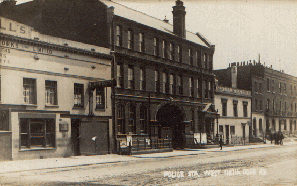Thursday, March 3rd., George Street, London.
I reached home from Liverpool late on Tuesday night and was run off my brain-legs yesterday until 7 p.m. The play went most excellently in Liverpool, and the house was full, and I went before the curtain and so on. The mischief was that Tayler and I had to go out to supper afterwards to meet the whole company. This feast lasted until 2 a.m. I was most gratified by the attentions of some of the young lady cast members; I think it must have gotten about that I am restored to bachelorhood (or thereabouts).
On reaching Euston on Tuesday we found Herman Finck, the music hall composer, had come to meet us, so the least I could do was ask him to come with us to the flat. He stayed yarning, being a good yarner, until 12.20 a.m. By that time I was dead with fatigue, though diverted by the yarns. Finck has been a prolific composer for the last twenty years and must have pots of money I should think. Apparently he conducted the first phonograph record of Tchaikovsky's "Nutcracker". A few risque stories about the famous 'Palace Girls' when he was conducting at the Palace Theatre which we were in a mood to enjoy.Yesterday I was determined to lunch quietly at home, which I did. But there was a Lyric Theatre meeting in the afternoon and in the evening I dined with Beaverbrook at Fulham. Couldn't get away from there because I had promised to deliver home in my brougham Helen Drury, B's sister, and Eleanor Smith, daughter of the Lord Chancellor. These young girls definitely refused to move until midnight, and I had to keep my end up. So bed at 1.15 for me. However I slept well which surprised me.
Off to the theatre yet again tonight for a first night of a David Garrick opera. Not looking forward to it, but what can you do?
.jpg)


























